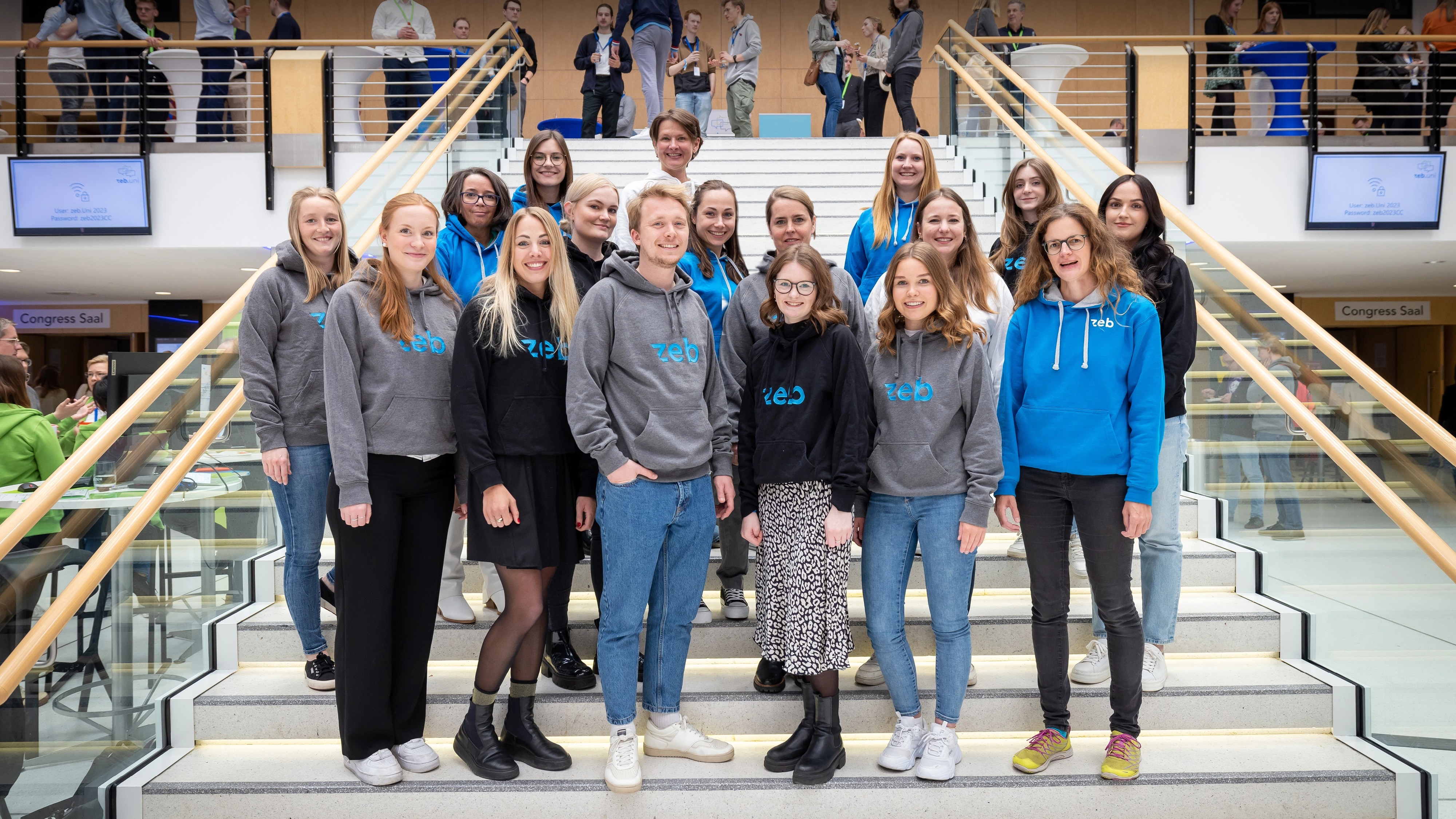How does a CDC-mentee relationship actually work?

Release date: 05.01.2022
Morten completed his integrated degree program at zeb in the summer of 2021 and was mentored and supported by his Career Development Counselor (CDC) Benjamin throughout. Find out here what’s behind the CDC/mentee model and what the two of them appreciate most about it.
Benjamin and Morten, could you introduce yourselves briefly and tell us what you do at zeb?
Benjamin: My name is Benjamin, I’m 31 years old and I have been with zeb since 2016. I started as a Consultant at the Berlin office directly after completing my studies in Business Informatics. In the meantime, I have become a Manager and I currently work in the area of implementing and customizing software solutions based on zeb.control.
Morten: My name is Morten, I grew up in Trier and I moved to Münster after graduating from high school. Since 2018, I have been working at zeb in the context of an integrated degree program in Business Informatics with a focus on consulting. I have recently completed my Bachelor’s degree and am now about to start as an Analyst at zeb, participating in the Bachelor Welcome Program.
Let’s get straight to the topic of our conversation. Please tell us what the terms “CDC” and “mentee” mean at zeb and what role you currently play.
Benjamin: At zeb, CDC is short for Career Development Counselor, roughly comparable to a supervisor with a strong mentoring character. A mentee is the employee assigned to a CDC. In this case, I take the role of CDC, while Morten is my mentee.
Morten: I would like to add that the mentor is also a person of trust and someone who anchors you. So not only a supervisor or manager but also a confidant.
Why does zeb have this model or, in other words, why does every zeb employee have a CDC?
Benjamin: At zeb, you are mainly organized in projects and therefore always have to deal with different colleagues and project managers. Since each project has a limited duration, the team composition changes all the time. Therefore, it is helpful that each employee has a fixed contact person who represents a constant regardless of the current project. That contact person is the CDC. He or she is there to discuss your career path, your development goals or any issues that occur. The CDC is a person of trust who operates independently of the day-to-day project work.
What topics do you discuss with each other or what are typical topics between CDC and mentee?
Morten: The topics that we discuss are usually very up-to-the-minute. For example, we talk about my studies and my current projects. But we also talk about my career path and further education opportunities such as training courses or seminars.
Benjamin: I can confirm that. In addition, there is the issue of annual objectives. In a joint discussion, we look at what objectives the mentee would like to achieve this year or next year and how both sides envisage his or her future career. The topic of promotion is also dealt with, of course.
What role does the CDC play in the evaluation/promotion of employees?
Benjamin: Above all, the CDC provides support in finding the right goals, because the annual objectives that we agree upon provide the framework for a possible promotion. The objectives should be ambitious but also realistic and the corresponding agreement is always formulated together with the mentee. If the objectives are achieved, the CDC may propose his or her mentee for promotion. The evaluation itself takes place via “270 degree feedback”. An independent evaluator talks to colleagues and project team members of the person being evaluated, reads through project performance reviews and looks at the work done, e.g. in the area of topic development and company impact. Based on all of these impressions, the evaluator ultimately prepares a year-end review as the result of a comprehensive process. In this way, the relationship of trust between CDC and mentee remains “uncompromised”.
What are typical points of contact between mentee and CDC? In what way and how often do they exchange ideas and opinions?
Morten: Each CDC/mentee pair agrees the frequency individually. Benjamin and I have a discussion every two weeks, but I’ve also heard that other duos talk once a month. In addition, there are other points of contact, e.g. at the Christmas party, the zeb.Uni or the Practice Group events.
Benjamin: That’s right, it’s all highly individual. Especially in the beginning we talked a lot, whereas now we have agreed on a two-week cycle.
Benjamin, why did you decide to become a CDC? Can any employee become a CDC and what are the prerequisites?
Benjamin: After a few years at zeb, I was no longer the “new guy” on projects, but able to give younger colleagues advice and tips. I found that really exciting. In addition, I gradually grew into the role of a (sub)project manager and was thus entrusted with leadership tasks. I realized I enjoyed it, so I approached our HR department with the idea of becoming a CDC. A prerequisite for assuming such a role is evidence of managerial responsibility as well as a leadership training program. Because I fulfilled these criteria, I was able to take on my first CDC role only a short while later.
From your perspective, is there a difference between a traditional supervisor/manager and a CDC?
Morten: I feel there is a big difference: thanks to the advising and not necessarily evaluating role, there is a much more personal relationship of trust between CDC and mentee.
Benjamin: I fully agree.
Finally, can you summarize what you particularly like about the CDC structure?
Morten: What I particularly like about the model is that every employee has a direct contact person throughout their time at zeb. This person takes on an independent role, as he or she usually doesn’t work on the same project or is not the project manager and can therefore, as a neutral person, assess situations and possible problems from a different perspective.
The possibility to change one’s CDC if necessary, e.g. to get new impulses, is also a great thing and tends to be rather difficult under traditional management models.
Benjamin: I feel the same way as Morten. I also think it’s fantastic that there is one key person who accompanies you on your career path in the long term, in my case since the beginning of my zeb career, and who therefore also knows your development. For me, the biggest advantage is that the CDC has no insight into the project work, but can in a certain way assess the development of the mentee objectively. This means that even if conflicts should arise on a project, the CDC can mediate as a neutral person. If one imagines a traditional departmental structure in this case, it is possible that a supervisor or manager is caught between two stools or even directly or indirectly involved. That won’t happen to a CDC, and that’s what I like most about it.
 en
en



















